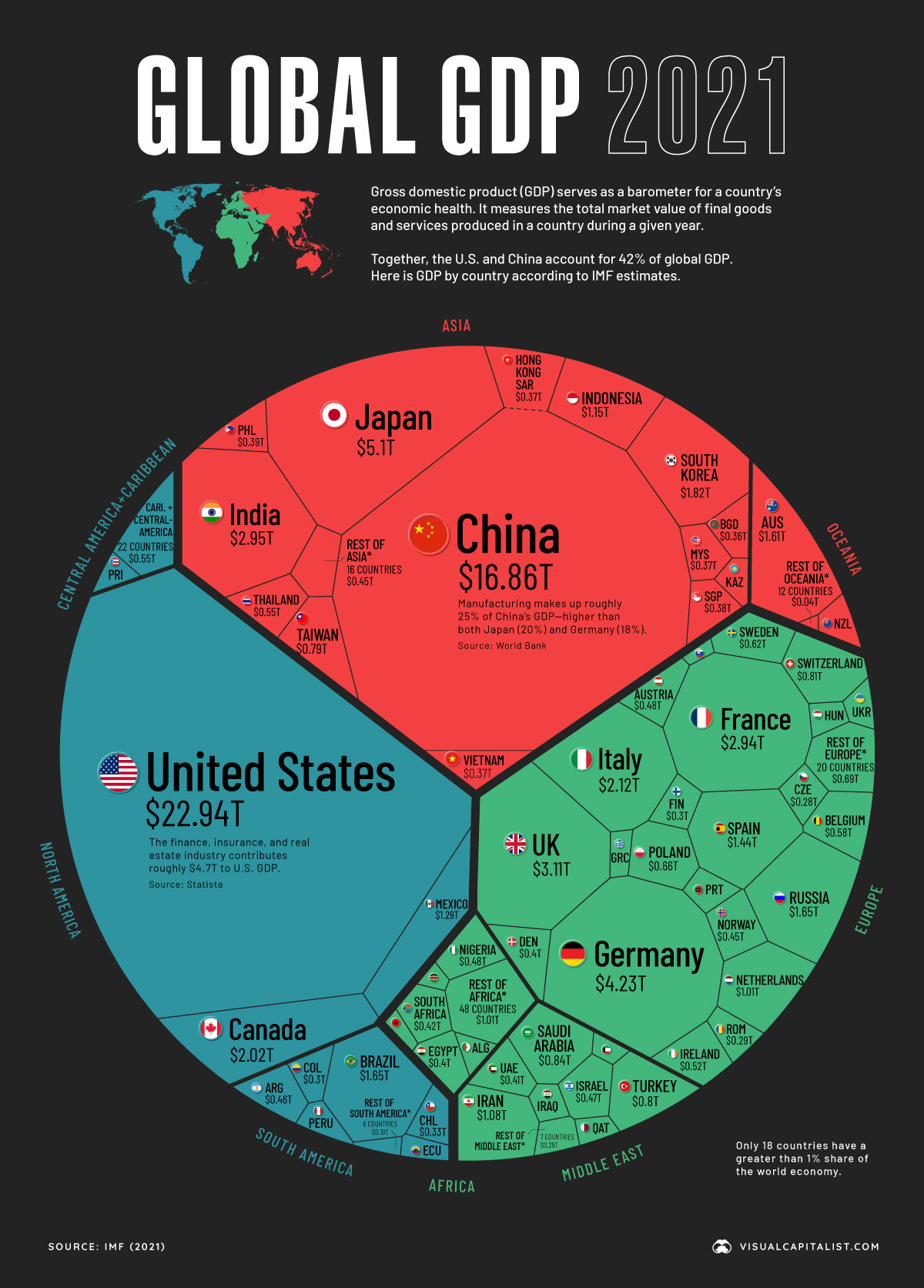By

Just four countries—the U.S., China, Japan, and Germany—make up over half of the world’s economic output by gross domestic product (GDP) in nominal terms. In fact, the GDP of the U.S. alone is greater than the combined GDP of 170 countries.
How do the different economies of the world compare? In this visualization we look at GDP by country in 2021, using data and estimates from the International Monetary Fund (IMF).
An Overview of GDP
GDP serves as a broad indicator for a country’s economic output. It measures the total market value of final goods and services produced in a country in a specific timeframe, such as a quarter or year. In addition, GDP also takes into consideration the output of services provided by the government, such as money spent on defense, healthcare, or education.
Generally speaking, when GDP is increasing in a country, it is a sign of greater economic activity that benefits workers and businesses (while the reverse is true for a decline).
The World Economy:
Who are the biggest contributors to the global economy? Here is the ranking of the 10 largest countries by GDP in 2021:
China’s economy is second in nominal terms, hovering at near $17 trillion in GDP. It remains the largest manufacturer worldwide based on output with extensive production of steel, electronics, and robotics, among others.
The largest economy in Europe is Germany, which exports roughly 20% of the world’s motor vehicles. In 2019, overall trade equalled nearly 90% of the country’s GDP.
The World Economy: 10 Smallest Countries
On the other end of the spectrum are the world’s smallest economies by GDP, primarily developing and island nations.
With a GDP of $70 million, Tuvalu is the smallest economy in the world. Situated between Hawaii and Australia, the largest industry of this volcanic archipelago relies on territorial fishing rights.
In addition, the country earns significant revenue from its “.tv” web domain. Between 2011 and 2019, it earned $5 million annually from companies—including Amazon-owned Twitch to license the Twitch.tv domain name—equivalent to roughly 7% of the country’s GDP.
The Fastest Growing Economies in the World in 2021
With 123% projected GDP growth, Libya’s economy is estimated to have the sharpest rise.
Oil is propelling its growth, with 1.2 million barrels being pumped in the country daily. Along with this, exports and a depressed currency are among the primary factors behind its recovery.
| Rank | Country | Region |
2021 Real GDP Growth (Annual % Change)
|
|---|---|---|---|
| 1 | 🇱🇾 Libya | Africa | 123.2% |
| 2 | 🇬🇾 Guyana | South America | 20.4% |
| 3 | 🇲🇴 Macao | Asia | 20.4% |
| 4 | 🇲🇻 Maldives | Asia | 18.9% |
| 5 | 🇮🇪 Ireland | Europe | 13.0% |
| 6 | 🇦🇼 Aruba | Caribbean | 12.8% |
| 7 | 🇵🇦 Panama | Central America | 12.0% |
| 8 | 🇨🇱 Chile | South America | 11.0% |
| 9 | 🇵🇪 Peru | South America | 10.0% |
| 10 | 🇩🇴 Dominican Republic | Caribbean | 9.5% |
Ireland’s economy, with a projected 13% real GDP growth, is being supported by the largest multinational corporations in the world. Facebook, TikTok, Google, Apple, and Pfizer all have their European headquarters in the country, which has a 12.5% corporate tax rate—or about half the global average. But these rates are set to change soon, as Ireland joined the OECD 15% minimum corporate tax rate agreement which was finalized in October 2021.
Macao’s economy bounced back after COVID-19 restrictions began to lift, but more storm clouds are on the horizon for the Chinese district. The CCP’s anti-corruption campaign and recent arrests could signal a more strained relationship between Mainland China and the world’s largest gambling hub.
Looking Ahead at the World’s GDP
The global GDP figure of $94 trillion may seem massive to us today, but such a total might seem much more modest in the future.
In 1970, the world economy was only about $3 trillion in GDP—or 30 times smaller than it is today. Over the next thirty years, the global economy is expected to more or less double again. By 2050, global GDP could total close to $180 trillion.




